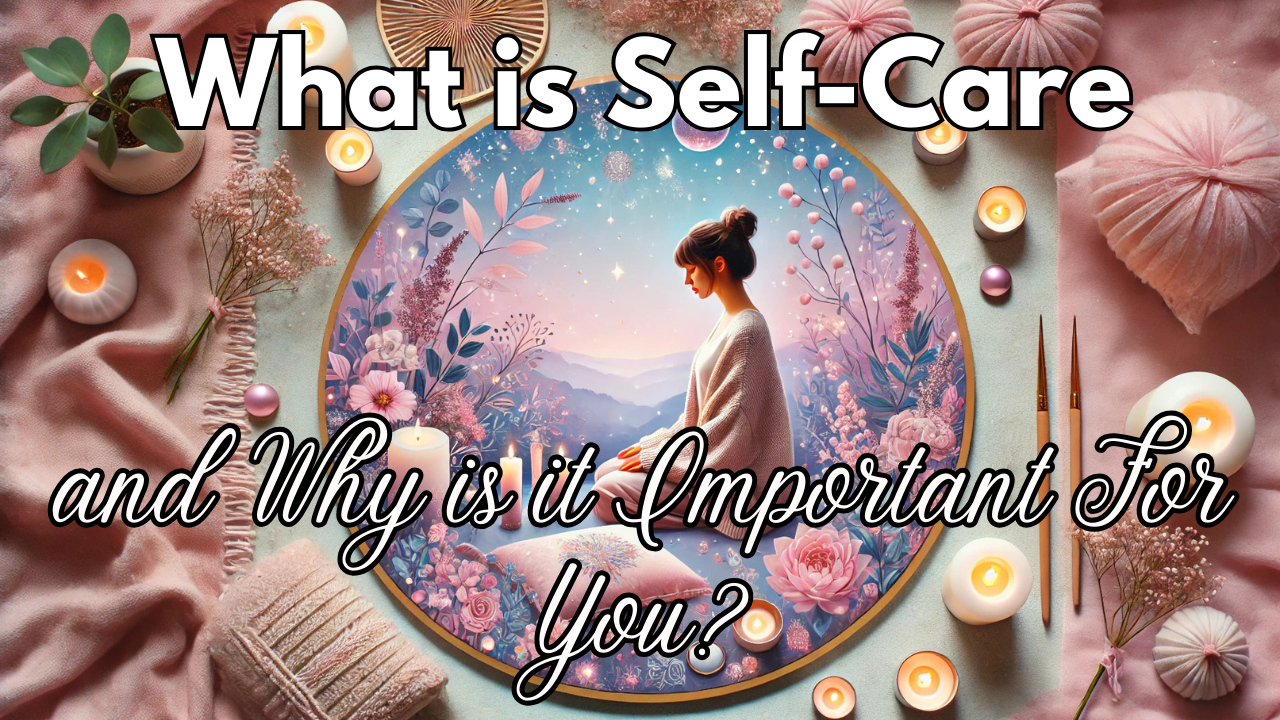What is Self-Care and Why is it Important For You?
Self-care is more than just a buzzword; it's essential for your well-being. The World Health Organization (WHO) says it's about actions to keep you healthy and manage health issues. It's key for both your body and mind.
Self-care isn't just for now; it's for the long run. It helps with chronic conditions, reduces stress, and boosts job happiness. It also prevents burnout and helps you grow personally.
Everyone needs to understand and practice self-care. It covers many areas like hygiene, diet, and lifestyle. By focusing on self-care, you're investing in a healthier, happier life.
Understanding Self-Care
The National Institute of Mental Health says self-care is about doing things that make you feel better physically and mentally. It's closely linked to mental health benefits and self-love practices that help you feel good overall.
Definition of Self-Care
Self-care is about keeping yourself healthy in many ways. The Substance Abuse and Mental Health Services Administration (SAMHSA) says it covers emotional, environmental, financial, and more. For instance, Dr. Wayne Jonas found that eating well boosts energy and focus.
The Different Dimensions of Self-Care
Everyone does self-care differently, but the goal is the same: stay healthy, prevent sickness, and handle illness well. Doing things like exercising, eating right, sleeping well, and managing stress are key. Dr. Wayne Jonas recommends at least 30 minutes of activity a day for better mood and health.
Also, eating well and drinking enough water are important. Taking care of your emotions with mindfulness and meditation is vital too. And, having good relationships and being part of a community are big parts of self-care. They help a lot with feeling well and practicing self-love.
Physical Self-Care
Physical self-care is key to a healthy life. It helps improve your quality of life and manage chronic conditions. Regular exercise, balanced meals, and enough sleep and water are essential.
Importance of Exercise
Regular physical activity is vital for your health. Studies show that 30 minutes of exercise daily can boost mood and sleep. It also reduces stress and depression.
Exercise can even help as much as antidepressants. It's important for preventing heart disease and obesity.
Nutrition and Healthy Eating
Eating a balanced diet is critical for physical self-care. A variety of nutrients keeps your body working well. Good nutrition boosts energy and immunity.
It also prevents heart diseases and strokes. Tailoring your diet to your needs improves your well-being.
Sleep and Rest
Getting enough sleep is vital for self-care. It refreshes your body and sharpens your mind. It also improves your mood and emotional stability.
Lack of sleep can harm your health. It weakens your immune system and affects your weight and brain function. Good sleep habits can greatly enhance your life quality.
Mental Self-Care
Mental self-care is about taking care of your mind. It involves doing things that help you grow and manage stress. This is key for your overall well-being and mental health.
Engaging Your Mind in Healthy Ways
Doing things that are good for your mind can really help you grow. Reading, solving puzzles, or learning something new can make your brain stronger. A survey found that self-care can make anxiety and depression go away.
This not only makes you more productive (67%) but also boosts your self-confidence (64%) and happiness (71%).
Mindfulness and Meditation
Mindfulness and meditation are great for managing stress. They help you stay in the moment and deal with negative thoughts better. During the COVID-19 pandemic, depression rates tripled, showing how important mental self-care is.
Mindfulness and meditation can lower anxiety and help you see life more positively.
- Build a routine: Regular meditation can help establish a sense of stability and reduce stress.
- Practice gratitude: Regularly reflecting on positive aspects of life can enhance mental well-being.
- Stay active: Activities that stimulate the mind promote personal growth and improve stress management.
| Benefit | Percentage |
|---|---|
| Self-Confidence | 64% |
| Productivity | 67% |
| Happiness | 71% |
Emotional Self-Care
Taking care of your emotions is key to good mental health. Studies show that emotional self-care lowers stress and anxiety. It also boosts happiness and overall well-being. By making emotional self-care a part of your day, you can avoid mental health problems like depression and anxiety.
Identifying and Expressing Emotions
Knowing and expressing your feelings is a big part of emotional self-care. Setting emotional boundaries helps keep relationships healthy and prevents burnout. A study found that setting clear emotional boundaries can make you feel 25% more positive.
Also, dealing with emotional triggers can reduce emotional pain by 15%. This improves your emotional intelligence.
Practicing Gratitude and Positivity
Being thankful and positive is also important for emotional health. Research shows that quiet time for reflection can make you 20% more emotionally resilient. These habits help you see the world in a better light, leading to better health and longer life.
Let's look at what experts say about emotional self-care:
| Benefit | Improvement Percentage |
|---|---|
| Reduction in Emotional Distress | 15% |
| Increased Positive Emotional Experiences | 25% |
| Improvement in Emotional Resilience | 20% |
| Reduction in Reliance on Reactive Emotional Responses | 20% |
| Increase in Proactive Coping Strategies | 40% |
Emotional self-care brings many benefits for a happier life. Mindfulness, setting boundaries, positive self-talk, and relaxation are key. By focusing on these self-care tips, you can greatly improve your emotional health.
Spiritual Self-Care
Spiritual self-care is a key part of being whole. It helps us connect deeply with ourselves and the world. It goes beyond religion, covering many practices that feed our spirits.
Connecting with Your Inner Self
Self-care is about finding peace and understanding ourselves. Meditation is a big help here. It makes us feel better and can help with anxiety and heart issues.
There are many types of meditation, like deep breathing and mindfulness. Just a few minutes each day can make a big difference. It helps us feel more stable and calm.
Journaling is another great way to connect with ourselves. It helps us share our thoughts and feelings. It also makes us more aware of our emotions. The American Psychological Association says it can increase self-awareness by 33%.
Being thankful for what we have also helps a lot. It can make us feel less stressed and more grounded. It's a simple way to find peace.
Engaging in Spiritual Practices
Doing spiritual things can really improve our well-being. Activities like walking in nature and making art can fill our spirits. The Pew Research Center found that 82% of people who connect with their spiritual community feel better emotionally.
Going to places of worship can also make us happier and healthier. People who go more than once a week live longer. Spiritual self-care is not just for feeling better; it's about feeling connected and finding purpose.
- Enhanced brain activity through meditation
- Faster recovery from surgery with strong spiritual beliefs
- Significantly longer lifespan with regular worship attendance
- Reduced stress and anxiety with gratitude practice
- Increased self-awareness through journaling
Wellness and spiritual self-care go hand in hand. They help us live a balanced and fulfilling life. Whether it's through meditation, community worship, or enjoying nature, these practices guide us on our journey to well-being and peace.
| Spiritual Practice | Associated Benefit |
|---|---|
| Meditation | Improved mental health and increased happiness |
| Gratitude Journaling | Reduced stress and enhanced self-awareness |
| Community Worship | Long lifespan and emotional well-being |
| Nature Connection | Solace and spiritual enrichment |
| Listening to Audiobooks | Inspiration and mental relaxation |
Social Self-Care
Healthy relationships and clear boundaries are key to social self-care. They help our emotional well-being, making sure we care for ourselves in our social lives too.
Building Healthy Relationships
It's important to spend time with family, friends, and the community. Having lunch with loved ones or joining group activities can make us feel loved. Volunteering and joining online groups can also be very rewarding.
Research shows social self-care can help with anxiety and depression. It reduces stress and improves physical health. Social interactions give us the emotional support we need for healthy relationships.
Setting Boundaries
Setting boundaries is a big part of social self-care. Boundaries help keep our interactions healthy and balanced. They prevent burnout and stress by controlling what others expect from us.
Having a self-care plan that includes social activities is essential. This means setting aside time for friends, talking openly with family, and getting involved in the community. By doing this, we improve our health and build a happy, balanced social life.
Financial Self-Care
Financial self-care is key to feeling good overall. It helps manage money stress and lets people control their financial future. A 2023 Bankrate survey found 52% of U.S. adults said money hurt their mental health. This shows the importance of taking care of finances for emotional health.
Creating a detailed financial plan is a good start. Working with financial advisors, like those at Benchmark Wealth Management, adds expertise. Rick and Thomas, the managing directors, have 48 years of experience in financial planning and more.
Tools like Empower’s free financial dashboard help track financial goals. Millions use these tools to see their financial health. Also, having a monthly money date to check finances is key for stress management.
Experts suggest saving three to six months' expenses for emergencies. Saving 10% to 15% for retirement is good for financial freedom later. Paying off high-interest debts quickly can also reduce stress.
Check bank and credit card statements to find and stop unnecessary spending. Learning about finance through podcasts and books helps reach financial goals. Using platforms like Experian to check your credit for free gives insight into your financial health.
| Financial Self-Care Practices | Benefits |
|---|---|
| Partner with Financial Advisors | Receive professional guidance and gain confidence |
| Utilize Empower’s Financial Tools | Gain a complete view of your financial picture |
| Schedule Monthly Money Dates | Consistently manage finances and reduce stress |
| Build Emergency Savings | Prepare for unforeseen circumstances |
| Pay Off High-Interest Debts | Save money over time and reduce financial burden |
| Monitor Credit | Understand your credit and improve financial health |
These financial self-care steps help manage stress and build financial security. They lay a strong foundation for financial well-being. This allows for a peaceful mind to focus on other self-care areas.
How Self-Care Enhances Your Well-being
In today's fast world, taking care of ourselves is often forgotten. Yet, the mental health benefits and overall well-being from self-care are huge.
Benefits of Regular Self-Care Practices
Self-care has many benefits, from better physical health to mental and emotional stability. It improves our lives in many ways. Here are some key advantages:
- Improved Sleep: Getting 7 to 9 hours of sleep each night is key for health. A study shows those who value quality sleep are 30% more likely to feel physically and mentally well than those who don't.
- Enhanced Mood with Exercise: Regular exercise can lower anxiety and boost mood, helping mental health. Healthy self-care tips suggest adding exercise to our daily routines.
- Healthy Eating: Eating a balanced diet with fruits, veggies, and healthy fats gives us energy. These eating habits also improve our health and well-being.
- Support System: Having strong relationships with friends and family boosts emotional well-being. A good support system is key to managing stress.
- Spiritual Connection: Practices like meditation or inner reflection can help with physical health and mental clarity. They improve our sense of well-being.
- Boundary Setting: Learning to say no and set boundaries can reduce stress and increase energy. It helps achieve a better work-life balance.
- Stress Reduction: Activities like meditation or deep breathing can cut stress by 40%. They lead to a calmer, more centered life.
- Increased Productivity: Self-care has been linked to a 15% increase in productivity in the tech industry. It shows how well-being is key to success.
- Overall Well-being: A structured self-care routine has led to a 25% increase in well-being in the healthcare industry. It shows self-care's importance in stressful jobs.
- Reduced Burnout: Healthy relationships and social connections have been linked to a 20% decrease in burnout. They show the emotional and psychological benefits of strong social networks.
By adding these self-care tips to our lives, we improve our well-being. We also become better at handling daily challenges. Remember, self-care is essential for a balanced and fulfilling life.
Self-Care Importance
Understanding self-care is key for personal growth and a balanced life. Many think it's selfish, but it's not. It's about taking care of ourselves so we can care for others better.
Why Self-Care is Not Selfish
The National Institute of Mental Health says self-care is vital for our health. Doing things like regular exercise, at least 30 minutes a day, helps us stay healthy.
Self-care also lowers stress, anxiety, and depression. UAB experts say it can even reduce heart disease and cancer risks.
Getting enough sleep is also important. Experts recommend seven to nine hours a night for our mental health. Having supportive family and friends also boosts our emotional well-being, as UAB experts note.
Self-care routines improve focus, productivity, and problem-solving skills. These benefits help us in our personal and professional lives, showing self-care is not selfish.
Creating a Personal Self-Care Plan
Creating a self-care plan that fits your life is key to feeling balanced. It should cover different self-care areas. This includes routines and tips that work for you.
Steps to Develop Your Plan
- Assess Your Current Self-Care Practices: Use tools like the Self-Care Assessment to see what you're doing right and what needs work.
- Identify Negative Coping Strategies: Know one bad habit you can stop or lessen.
- Incorporate Positive Strategies: Use the Maintenance Self-Care Worksheet to add new habits, face challenges, and find solutions.
- Prepare for Stressful Situations: Make an Emergency Self-Care Worksheet for when things get tough. It helps you stay calm.
- Track and Reflect: Keep an eye on how you're doing, celebrate wins, tackle tough spots, and tweak your plan as needed.
Examples of Self-Care Activities
- Physical Self-Care
- Stick to a sleep schedule
- Do regular exercise, like jogging or yoga
- Emotional Self-Care
- Write in a journal to reflect
- Focus on the good things in life
- Spiritual Self-Care
- Try meditation or yoga
- Enjoy nature
- Social Self-Care
- Stay close to family and friends
- Set boundaries to protect your time
- Financial Self-Care
- Manage your budget and track spending
- Save for the future
| Self-Care Plan Category | Activities/Strategies |
|---|---|
| Work | Set boundaries, take breaks |
| Physical Fitness | Join a gym, go for walks |
| Emotional Life | See a therapist, practice gratitude |
| Relationships & Community | Volunteer, spend time with loved ones |
Make a visual plan and share it with others for support. Sticking to your self-care plan is key. It's about making self-care a part of your everyday life.
Challenges in Practicing Self-Care
Self-care can be tough, with big hurdles in stress management and self-care importance. A study by Hanna K.M. and Decker C.L. (2010) found that only 24% of teens with type 1 diabetes take care of themselves. This shows a big gap that highlights the need for more support.
It's not just teens. People with other chronic diseases also face big challenges, with 59% saying they struggle, as Bayliss E.A. et al. (2003) found. Their complex health needs call for a detailed approach that values self-care importance.
Self-care is key to avoiding serious health problems. Cook-Cottone C. (2016) showed that mindful self-care can prevent eating disorders. This means that good stress management can really help avoid these issues.
The COCO study showed different self-care methods among primary care patients, as Weltermann B.M. et al. (2015) discovered. Costa I.G. et al. (2017) also looked at self-care for diabetic foot ulcers, showing how to tackle specific health issues.
Dealing with cancer fatigue adds another layer of complexity. Erickson J.M. et al. (2013) found that special self-care plans can help with fatigue during radiation therapy. This shows that tailored self-care can improve life during tough treatments.
A survey by Vagaro found that 75% of Americans see the value in a personal wellness routine for stress relief. This shows a strong understanding of self-care importance.
Self-Care Month every year reminds us of the ongoing need to care for ourselves. It runs from June 24th to July 24th, ending with Self-Care Day. It emphasizes that self-care is something we do every day.
| Study | Focus | Key Findings |
|---|---|---|
| Hanna K.M. and Decker C.L. (2010) | Adolescent Diabetes | Only 24% assume self-care responsibility |
| Bayliss E.A. et al. (2003) | Comorbid Chronic Diseases | 59% face self-care barriers |
| Cook-Cottone C. (2016) | Eating Disorders Prevention | Self-regulation and mindful self-care are key |
| Weltermann B.M. et al. (2015) | Common Colds Self-Care | Variations among primary care patients |
| Costa I.G. et al. (2017) | Diabetic Foot Ulcers | Enhanced care strategies needed |
| Erickson J.M. et al. (2013) | Radiation Therapy Fatigue | Self-care strategies alleviate fatigue |
| Vagaro Survey | Personal Wellness Routine | 75% believe it reduces stress |
Good news is that mindfulness, nature walks, and hobbies are great for stress management. They help create a peaceful space for the mind. This shows the self-care importance we should follow every day.
Conclusion
Self-care is more than just treating yourself. It's the core of living a balanced and fulfilling life. Studies show that self-care has many benefits for our health. It can improve our quality of life and even reduce emergency visits for some people.
But, the impact on hospital admissions and costs is not as clear. Research points to the value of personalized self-care, like for kids and teens. Tailored and direct self-care can greatly improve their lives.
Self-care is essential, not just a luxury. It helps us grow and become resilient. Activities like exercise, enough sleep, and mindful eating are key to staying well.
The importance of self-care is undeniable. It helps us manage stress and feel better emotionally. By doing self-care, we can live healthier and happier lives.
Adding self-care to our daily lives can make a big difference. It shows that self-care is vital in today's world.
P.S. Whenever you’re ready, I would love to support you on your journey! There are currently 6 main ways Meraki Daydream can help you:
#1: Gratitude Journal Freebie:
Gratitude is the foundation of your mindful living journey. If you’re ready to start your daily gratitude practice, grab your free gratitude journal here.
#2: Shop Meraki Daydream for Intentional Fashion and Accessories:
Are you ready to channel your inner goddess and feel confident and empowered while turning daily activities into magical rituals?
#3: Manifestation Magic Potion Guide + Rituals:
If you’re confused by all the tips and tricks floating around the internet about manifestation, and you tried most of them with no results, this is for you.
In this guide, we demystify and debunk common manifestation myths and give you actionable instructions to help you actually achieve success on your manifestation journey.
#4: Spirituality and Self-Love Membership Community:
Tired of not seeing success on your spirituality, self-love and personal growth journey?
Join our spirituality and self-love membership where you can interact with an amazing community of like-minded people, and gain access to practical, actionable resources that have actually been helpful and effective for facilitating internal and external transformation on my personal journey.
#5: Mindful Business Membership Community:
Is your business putting you on the fast-track to burnout? The vibrant, growing community of like-minded people and the large array of actionable resources ensure that you have everything you need to be kind to yourself while growing your business sustainably.
Join our mindful business membership if you’re an entrepreneur who wants to adopt a more effective, but less exhausting approach to professional life.
#6: VIP Support in Both Memberships:
For each membership, you will be given the option to access VIP support, where I, Vansa, will personally assist you and give you feedback and guidance on your individual journey in an interactive group chat.
Just head over to the relevant membership and select the VIP option that suits you best.
Source Links
- Self-Care Is a Trendy Buzzword, but What Exactly Is It? - https://www.verywellhealth.com/what-is-self-care-5212781
- What Is Self-Care and Why Is it Important? - https://www.ncoa.org/adviser/online-therapy/self-care/
- THE IMPORTANCE OF SELF-CARE - https://perimeterhealthcare.com/news/posts/the-importance-of-self-care
- Self-care: What is it? Why is it so important for your health? - https://www.uab.edu/news/youcanuse/item/13176-self-care-what-is-it-why-is-it-so-important-for-your-health
- What Is Self-Care? - https://www.healthline.com/health/self-care-is-not-just-treating-yourself
- The Importance of Self-care - #BeThe1To - https://www.bethe1to.com/the-importance-of-self-care/
- Physical Self-care - https://www.mymentalhealth.guide/self-care/physical-self-care
- Self-Care Hub - https://www.everydayhealth.com/self-care/
- 5 Types of Self-Care for Every Area of Your Life - https://www.verywellmind.com/self-care-strategies-overall-stress-reduction-3144729
- How and Why to Practice Self-care - https://www.mentalhealthfirstaid.org/2022/03/how-and-why-to-practice-self-care/
- The Connection Between Self-Care and Mental Health - https://www.psychologytoday.com/us/blog/a-deeper-wellness/202302/understanding-the-mental-health-and-self-care-connection
- Emotional Self-Care: What It Is and How to Make It Part of Your Life - https://advantagecaredtc.org/emotional-self-care/
- Emotional Self-Care: Importance, Benefits, Practices - The Human Condition - https://thehumancondition.com/emotional-self-care-importance-benefits-practices/
- Take Care of Your Spirit - https://www.mhanational.org/take-care-your-spirit
- Self-Care Series (Part 3) – Oregon Counseling - https://oregoncounseling.com/article/self-care-series-part-3-spiritual-self-care/
- Spiritual Health First Aid for Self-Care: Nursing During COVID-19 - https://www.ncbi.nlm.nih.gov/pmc/articles/PMC8183245/
- What is Self-Care and Why is it Important For You? - https://www.snhu.edu/about-us/newsroom/health/what-is-self-care
- Why You Require Social Self-Care & Simple Helpful Ways for it to Happen - https://www.susansoaps.com/why-you-require-social-self-care-simple-helpful-ways-for-it-to-happen/?srsltid=AfmBOopZNHiGSbHvKAdM3wXMLko-Z99LEokY7vYO1Q49cj6N-SgtGUdH
- Financial Self-Care: How to Practice It and Why It Matters - https://benchmarkwealthmgmt.com/how-to-practice-financial-self-care-and-why-it-matters/
- Financial self-care: What it is & how I practice it - https://www.empower.com/the-currency/play/financial-self-care
- 6 Tips for Practicing Financial Self-Care - Experian - https://www.experian.com/blogs/ask-experian/financial-self-care-tips/
- Thrive tip: How to Incorporate Self-Care for Your Well-Being - https://hr.wustl.edu/how-to-incorporate-self-care-for-your-well-being/
- Self-Care: A Guide to Nurturing Your Well-Being - Primary Health Network - https://www.primary-health.net/blog/self-care-guide-to-your-well-being/
- Developing Your Self-Care Plan - https://socialwork.buffalo.edu/resources/self-care-starter-kit/developing-your-self-care-plan.html
- Why You Need a Self-Care Plan - https://www.mindful.org/why-you-need-a-self-care-plan/
- Developing a self-care plan - https://schools.au.reachout.com/teacher-wellbeing/developing-a-self-care-plan
- Self-care: A concept analysis - https://www.ncbi.nlm.nih.gov/pmc/articles/PMC8488814/
- The Power of Self-Care - https://saliencehealth.com/news/the-power-of-self-care/
- Discussion and conclusions - Self-care support for children and adolescents with long-term conditions: the REfOCUS evidence synthesis - https://www.ncbi.nlm.nih.gov/books/NBK476433/
- The Importance of Self-care for Mental Health and Well being | Improving Lives Counseling Services - https://improvinglivescounseling.com/the-importance-of-self-care-for-mental-health-and-well-being/
- The Importance of Self-Care: Prioritizing Your Health and Well-Being - https://www.linkedin.com/pulse/importance-self-care-prioritizing-your-health-well-being-biopatrika





 https://merakidaydream.com/pages/about-us
https://merakidaydream.com/pages/about-us

分享並獲得 15% 折扣!
只需在以下社交網路之一上分享此產品,您就可以享受 15% 的折扣!